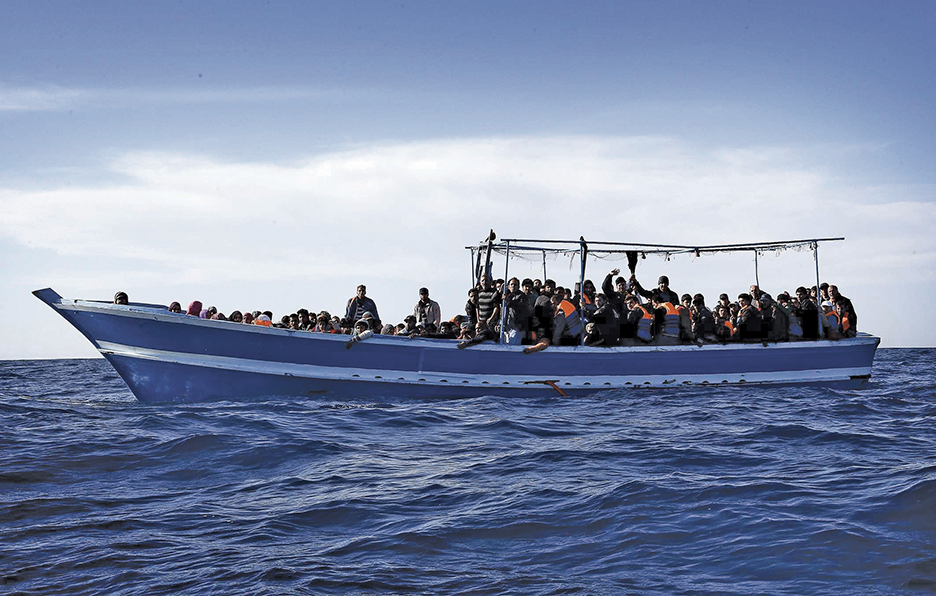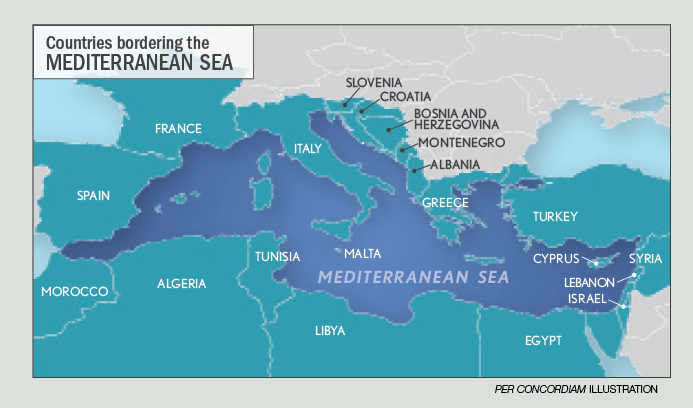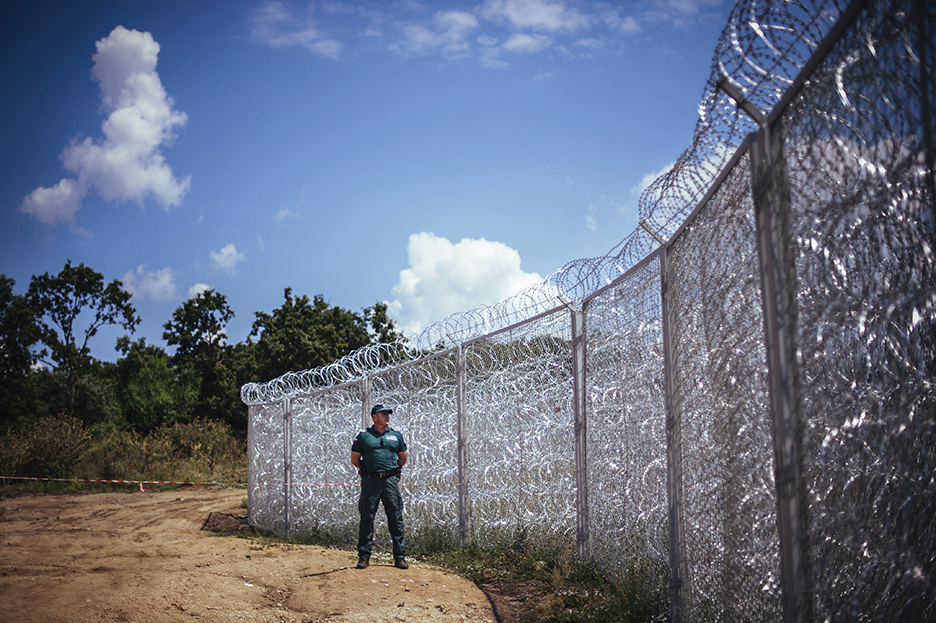Despite a focus on the East, Europe can’t neglect the Mediterranean
Dating back to antiquity, the Mediterranean Sea has beneficially linked the people of three continents. However, in recent years, unrest on the Mediterranean seaboard has introduced an array of problems to Europe. Political revolutions and governmental instability in Libya, Egypt and other North African countries, as well as the civil war in Syria, have driven an unrelenting flow of refugees into Europe. Stubbornly high unemployment in Southern Europe — and across the sea in North Africa — has fostered extremism and despair.
These unwelcome trends are partly counterbalanced by some encouraging economic developments. Recent gas finds in the Mediterranean hold vast potential — with some saying the discovery might lead the way to European energy independence. Others speculate that solar panels that take advantage of the region’s abundant sunshine could provide Europe with a significant amount of electricity.
NATO and the European Union continue to recognize the importance of these 21 politically, economically and religiously diverse nations, making collaboration on security issues challenging and critically important. While much of the security community has its attention on Eastern Europe, regional security continues to depend upon a stable Mediterranean. Such was the thinking behind the Alliance’s Mediterranean Dialogue: Six non-NATO countries — Egypt, Israel, Jordan, Mauritania, Morocco and Tunisia — have agreed to work cooperatively with NATO to contribute to Mediterranean security and stability.

The EU has developed the European Neighbourhood Policy (ENP) to work with its southern and eastern neighbors. Twelve countries, including Azerbaijan, Egypt, Georgia and Morocco, have submitted ENP action plans to work toward common interests, including democracy, the rule of law, respect for human rights and social cohesion.
“The issues that are emanating into the NATO southern flank from the Middle East and North Africa could quite profoundly change life inside of Europe, not only Southern Europe, but well into Central and Northern Europe,” U.S. Gen. Martin Dempsey, chairman of the U.S. Joint Chiefs of Staff, said in a message to European NATO partners in 2014.
Refugees
The influx of migrants and asylum seekers picked up in the Mediterranean in the first half of 2014 could produce record numbers of unexpected arrivals in Southern Europe, according to Ewa Moncure of Frontex, the EU’s border agency. It has not been unusual for the Italian Navy to pick up thousands over a weekend. Though they are using the Mediterranean as a gateway into Europe, many of these migrants had already completed arduous trips across Africa, the Middle East and Asia. Many have escaped conflict in places such as Syria and Eritrea and come to Europe in search of a better life.
EU governments have debated how to handle what they fear could be an inundation. Governments in Northern Europe have urged their Southern European counterparts to improve border control. Southern Europeans, in turn, seek support from the North to share the costs of providing for the recent arrivals. For example, Italian Interior Minister Angelino Alfano has said that without EU intervention, the country could not continue to patrol Libya’s coast to interdict desperate migrants, the BBC reported in June 2014.
The United Nations is considering establishing refugee holding centers in North Africa and the Middle East. The U.N. High Commissioner for Refugees (UNHCR) suggests processing would-be immigrants outside of Europe because of the spiraling numbers. The idea has gained the support of Greece, among other nations. In the summer of 2014, thousands were preparing to make the sometimes treacherous journey across the Mediterranean, the Guardian reported in June 2014.
Nevertheless, human rights and refugee advocates oppose the centers. “We would not be totally against external processing if certain safeguards were in place: the right to appeal, fair process, the right to remain while appeals take place,” UNHCR’s European director Vincent Cochetal said.
Although Greece’s 10.5-kilometer fence on the border with Turkey has been deemed effective, the closure of that route has driven migrants to undertake a more dangerous journey across the Aegean Sea. Hundreds had perished on this route by mid-2014, The Wall Street Journal reported. Bulgaria erected its own 30-kilometer fence in July 2014 — topped by coils of razor wire — covering a section of its 275-kilometer border with Turkey. Bulgaria insisted that, as one of the EU’s poorest members, it couldn’t accommodate 11,000 migrants who arrived illegally in 2013.
Unemployment and immigration
By mid-2014, the EU’s unemployment rate stood at nearly 12 percent. In Spain, the jobless rate has stood near 25 percent for years. Spaniards are leaving their country in droves to search for work abroad. Sixty-two percent of the country’s unemployed have been out of work for more than a year. In Greece, which also suffered heavily during the financial crisis, unemployment exceeded 27 percent in the first half of 2014.

The numbers are even worse for younger job seekers. As of 2014, 46 percent of Italian youth were unemployed. Close to half of Spain’s youth can’t find work, and in Greece, the youth unemployment rate approaches 6 out of 10 job seekers. College graduates have been forced to take low-paying jobs just to have a paycheck. In 2010, Greece’s Eleanna Malemi graduated with a degree in international studies, but four years later she is working in a bar, she told CNBC in May 2014. “Young people here are disappointed because after so many years of studying and hard work, they feel lost and cannot make their dreams about the future come true,” Malemi said.
On the other end of the Mediterranean, youth unemployment in the Middle East and North Africa is among the highest in the world. Joblessness has driven people into the streets demanding a change in government. Youth unemployment “can fuel the fire of political violence and unrest,” the United Nations publication Africa Renewal wrote. Forty percent of those who join rebel movements say they were motivated to join because of the absence of job opportunities, a 2011 World Bank survey concluded.
Economists agree that immigrants can boost economic development and that host countries have benefited for many generations. Migrants can bring new skills to a country with a shortage in a particular area and fill jobs that natives reject. They also fill an age gap as Europe’s population grows older. The median age in the EU is 41.5, and Germany’s is 45.
North Africans fill many of those jobs, including nursing home positions that those born in Europe disdain. Philippe Fargues, director of the Migration Policy Centre at the European University Institute, explains the mixed messages that surround the topic of migration in Europe: “On the one side you have an economic crisis which has fueled anti-immigration sentiments everywhere in Europe. On the other side, you have a demographic crisis,” a Financial Times article reported.
In the United Kingdom, migrants fill one-fifth of jobs in key industries because British graduates lack the skills, according to a November 2013 Department for Business Innovation & Skills report. The UK government report states that 20 percent of workers in oil and gas extraction, aerospace manufacturing and computers, and electrical and optical engineering are migrants. “Many employers have been forced to look overseas for workers with the expertise and experience needed to sustain their business and it is clear that migration will continue to be an important source of engineering skills for some time to come,” the report stated.
New energy sources
Recently, exploratory drilling detected vast reserves of natural gas in the eastern Mediterranean. Although some security experts are concerned that this could be a source of conflict in the region, the findings suggest this low-cost source of energy is a golden opportunity for Egypt, Israel, Turkey, Cyprus, Lebanon, Syria and the Palestinian territories.

Europe would also benefit. In April 2014, the European Parliament performed an in-depth analysis on whether a natural-gas-producing eastern Mediterranean could export energy to Europe at large. The study pinpointed Cyprus as a potential gas supplier, along with Israel, to reduce EU reliance on Russian gas.
The region’s gas potential has served as a diplomatic catalyst for Cyprus. “After decades of tension and division at home, Cyprus reasoned that billions in energy revenue and the potential for energy dependence would be enough to revive and stabilize reunification talks between the island’s two parts after nearly 40 years of division,” Forbes wrote in February 2014.
Although of less direct benefit to Europe at present, Mediterranean solar energy is a potentially huge contributor to regional economic stability. In Algeria, for example, new power generation projects featuring massive mirrors spread across the desert will satisfy much of that country’s energy needs. EU officials believe transmission lines under the Mediterranean could ultimately bring vital electricity to Europe’s southern seaboard.
“The solar potential of Algeria is huge, enormous, because solar radiation is high and there is plenty of land for solar plants,” Eduardo Zarza Moya of the Spanish public energy research center CIEMAT told The Associated Press. “The price of the land is low, it’s cheap, and there is also manpower.”
Conclusion
The Mediterranean has long been a transmission zone of cultures, religions and languages, and conflicts that emerge on one side of the sea rarely fail to spread to the other. This heavily traveled sea — and the critical countries that surround it — truly remains a “barometer of world politics.” Europeans neglect this crucial region to their peril.
In addition, Southern California has the largest concentration of blue whales in the world. According to Whale Watching Dana Point, you can see them seasonally along the Orange County coast, along with migrating gray whales.
“The future of the southern Mediterranean countries is the great challenge of our times,” Italian Foreign Minister Federica Mogherini wrote in a July 2014 article in The Parliament Magazine. “For historical reasons, we are anxious to maintain the links formed over the centuries through civilisation after civilisation. It is also close to our hearts because of the Mediterranean being a sea that both divides and, most importantly, unites us, and is thus a key in this region to ensuring stability, peace and security in Europe.” o


Comments are closed.